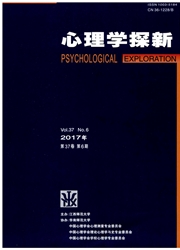

 中文摘要:
中文摘要:
采用实验法考察高自尊威胁后个体防御和消极情绪的特点,并分别考察自尊水平和自我价值权变性对自尊威胁后防御和消极情绪的不同调节作用。结果表明:(1)与受到低自尊威胁的大学生被试相比,高自尊威胁后被试表现出了较高的防御和消极情绪。(2)自尊水平能够在自尊威胁和消极情绪之间起调节作用,具体表现在,高自尊被试在高威胁后表现出了较高的消极情绪,而在低威胁后消极情绪较低;对于低自尊被试,无论自尊威胁程度如何,他们都表现出了较高的消极情绪。(3)自我价值权变性能够在自尊威胁和防御之间起调节作用,具体表现在,高自我价值权变性的被试在高自尊威胁后表现出了较高的防御,而低自尊威胁后防御较低;而低自我价值权变性的被试在两种威胁后都表现出了较高的防御。
 英文摘要:
英文摘要:
The present study explored college students' self defensiveness and negative emotion after self- esteem threat using experiment method, and explored the moderating effect of self - esteem and contingency of self - worth between self - esteem threat and the reaction variables separately. The results indicated as follows : ( 1 ) Compared to participants in low self - esteem threat condition, participants in high self - esteem threat condition exhibited significantly higher self defensiveness and negative emotion. (2) The effect of threat on negative emotion was moderated by self - esteem. Specifically, participants with high self - esteem exhibited higher negative emotion in high threat condition rather than in low threat condition. Participants with low self- esteem exhibited high negative emotion in both high and low threat conditions. ( 3 ) The effect of threat on self defensiveness was moderated by contingency of self - worth. Specifically,participants with high contingency of self - worth exhibited higher self defensiveness in high threat condition rather than in low threat condition. Participants with low contingency of self - worth exhibited high self defensiveness no matter high or low threat conditions.
 同期刊论文项目
同期刊论文项目
 同项目期刊论文
同项目期刊论文
 期刊信息
期刊信息
